Hestia's Personal File is the space intended to collect all the information related to the basic data of the user of Social Services, and certain complementary information that may be useful to have, and at the same time, it allows you to see the various interventions that are carried out or have been carried out with the user, from any area or service, given that the personal file may be linked to one or more files of the same basic social service or other services, and to do so while maintaining the uniqueness of personal data.
- It allows the unique recording of each person's own data, and is a distinct element and at the same time related to the files.
- It does not store any type of follow-up or treatment action, given that in Hèstia, the space intended to be able to register and manage professional attention are the records of the various areas and/or services.
- Any service professional can create, access and register information in this section.
- The personal file can be modified at any time. Therefore, you can enter data that was not reported at the time of registration, or modify it if necessary.
The History button present in the navigation bar in any of the tabs of the Personal Profile, allows you to know the changes of professional, municipality or team of the user throughout his career in the service.
important
In order to be able to add claims, problems, resources or procedures to a person's file, it is mandatory that the field of the municipality of residence on the personal file matches a municipality under the responsibility of the ABSS. If the registered municipality of residence is different from the ABSS or is not filled in, we will only be able to register actions (according to the social services law we must attend to everyone, but we are not obliged to provide resources, or make a social diagnosis if they are not residents of our municipality).
The Traceability tab shows the list of interventions that are carried out or have been carried out with the person from various services and/or areas, through the files in which this person is linked.
From this space you can also access any file of the various services, as long as you have the permissions that enable the professional to access it.
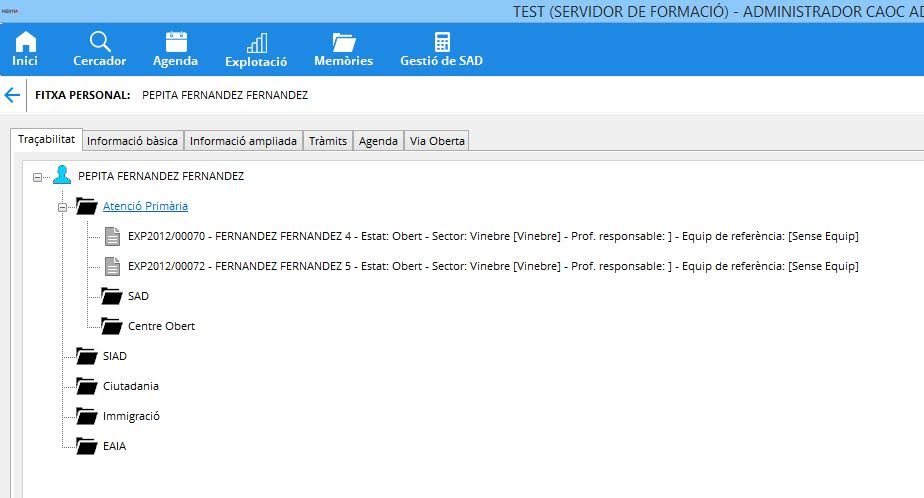
And when a citizen approaches social services for the first time and requests to be attended to by a service professional, it is necessary, prior to giving them an appointment with the professional who will attend to them, create your personal profile in Hèstia.
In order to create the file, you must press the "New person" button on the navigation bar located both in the search engine and in the professional agenda.
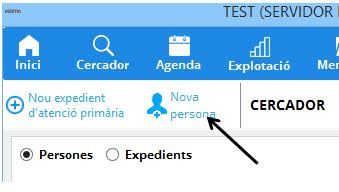
The form for creating a new file will then open, accessing directly the Basic Tab of the Personal File, where we will see several registration fields.
It should be noted that some of these fields are mandatory, while others, although their registration is not mandatory, it is important to register whenever we have the information.
The mandatory fields are the following:
- Name and first Surname
- Date of Birth : once entered, the form automatically calculates the person's age. Depending on the age, the documentation field will be mandatory or not.
- Documentation: this field is mandatory from the age preconfigured by each local body. It incorporates the possibility of registering various types of documentation (NIF/NIE, Passport, DNI without Letter,...).
- Municipality: it is one of the essential fields at the same time as carrying out the consultation on the registry from Hèstia. It is important to bear in mind that the belonging to a municipality of a person determines the possibility of intervention given that, depending on this information, it will be possible to either collect personal data and generate procedures for the person registered in the same municipality or not, we can also generate content in files, as long as the person's municipality matches that of the local body, the professional and that of the intervention file.
- Team: this will be the reference team for this person (by area or territory), according to the organization of the service and care.
- Reference professional : professional responsible for the development of interventions with the person (this professional must be part of the reference team).
By default, Hestia already fills in the Professional registration field.
RECOMMENDATION: despite not being a mandatory field, informing the person's energy dependence field on the form can facilitate the management of their IRER with the energy companies, if necessary.
The rest of the fields are optional and it is up to the organizational discretion of each Basic Area to decide which fields need to be filled in, who fills them in and at what point in the process and, although some of the fields in the basic information tab are not mandatory recommends professionals to fill in as many fields as possible in order to have the data at the moment they may need it, such as to be able to access other functionalities offered by the Hèstia service (consult services Via Oberta: data Padró, Title Large Family, Title Single Parent Family, Degree of Disability,...).

When accessing Hèstia, when the professional identifies himself to access with his usual user and password, he will see that he can also access the tool with a digital certificate.
In the event that the professional accesses the Hèstia service with these credentials (user/password + digital certificate), he will be able to query the population register, as well as other queries that Hèstia incorporates through Via Oberta (if they have these queries are authorized; otherwise, it is necessary to speak to the Interoperability Manager of the ABSS body).
The consultation in Padró is carried out from the Personal File/Basic data tab.
It will be necessary to register beforehand, the documentation field and the municipality of the "Inquiry in Padró" tab, and press the "inquiry" button, so that Hèstia displays the data that matches this query.
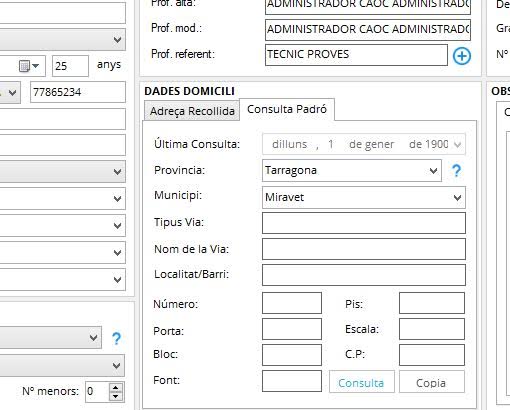
Subsequently, and if deemed appropriate, the query information can be transferred to the "Collection Address" tab, as well as other data available at the time of the query - name, surname, date of birth, .. – . To do so, press the "Copy" button.
The collected address tab and the registry query tab may have inconsistent data recorded, given that we can work with a citizen who lives in one address and remains registered in a different one. It is the professional who decides if he wants to keep more than one address of the user (the official address returned by the consultation of the Register and another alternative address).
Reserved space to record the professionals' notes. The content of this space is not accessible by the citizen in the event of the exercise of his ARCO rights. However, it should be borne in mind that the public authorities, such as the judicial authorities,..., in the exercise of their functions attributed to them pursuant to article 11.1 d) of Organic Law 15/1999, of 13 December, on the protection of personal data, they can request this data.
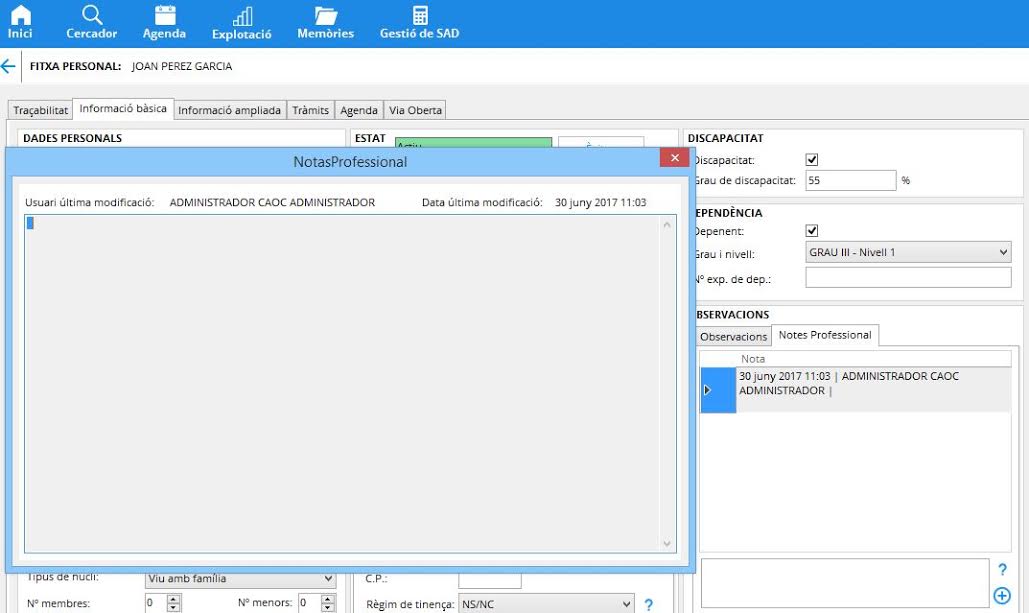
It is of great importance to have the Data Consent Form of the person(s) with whom you will work and who are registered with the Service.
For this reason, Hestia incorporates the " Consent " button, from which the identifying data of the user is transferred to a document in a standardized format (with customization configurable by ABSS), ready to print, and because the user the compliant sign authorizes the Basic Area to use their personal data in accordance with Organic Law 15/1999, Royal Decree 1720/2007 and the LOPD.

The document is personal, so if the object of the intervention is a minor or an incapacitated person, the document must be signed by the guardian or legal representative.
When the professional has the data consent form signed by the user, it must be recorded as such, in the space reserved on the Basic Data tab of the Personal File.
When a new file is opened, the user must sign the consent form.
Once the Personal Data has been entered, we will save the information collected by clicking on the Save button. The program will generate a message asking the professional if he agrees to create a new file.

If he accepts it, the file will now be available to all professional users of Hestia within the same Basic Area.
In the Hèstia program, Personal Cards can only have two states: "Active" or "Successful". This information appears in the upper right of the tab's basic information window.
![]()
Personal files pass to "Success" status in the event of death. This change leads to the expiration of resources and the closing of files (if it is the only file linked to the file). The successful date, which we will be prompted for after clicking the button, will be used as the closing date for all documentation related to the listing.
You can reactivate a person marked as successful, or modify the date of death, as long as it was a mistake. Anyone who has the role of technician or coordinator can manage the reactivation or modification of the date by clicking the "Recover" button .
![]()
A personal file can be canceled only in the event that the citizen has no file or appointment linked, and this action is restricted to the role of administrator, coordinator, or skilled technicians.
This is the tab that allows collecting "additional" data from the user.
The program allows, in this tab, to collect information related to the person's income, employment relationship, legal status as a newly arrived person, or information related to educational or health centers.
However, it is important to bear in mind that most of this data can be modified over time, and therefore it is necessary to constantly update it (evolution and decrease in the person's income, pending or completed regrouping, evolution of the center of teaching, ...).
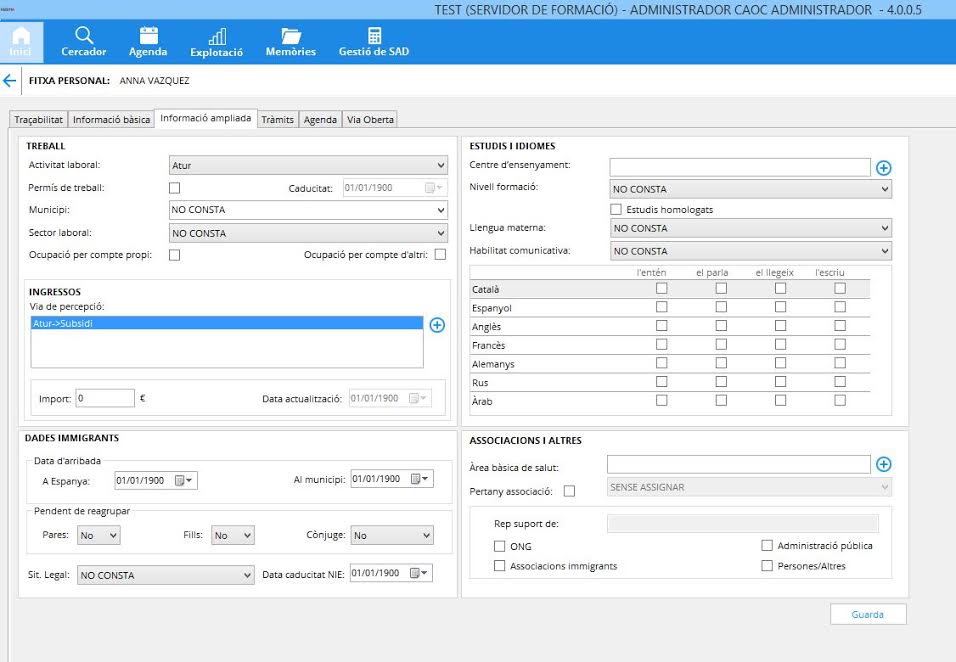
Through this tab, the professional will be able to add procedures to the user. This functionality can also be done by the professional with the role of administrative assistant.
At the same time, from the same tab you will be able to view the list of procedures registered for a person, regardless of their status (processed, granted or denied) or if they have been registered in the personal file or in the file(s) to which this person/s is linked
To add a procedure, the professional will click on the "Add procedure" enabled button.
A pop-up window will then open, in which you must select the Sector and Subsector, and then the scope of intervention to which the procedure is related, and the type of procedure: Own or Generalitat.

Once the procedure is selected, it will be shown in the list of procedures, which allows, at the same time, to see or modify the status of the same, or to generate the associated document, in a Word document.
The listing will also show the status of the procedure (processed/granted/denied).

Hestia also allows the procedures to be recorded in the intervention file. Therefore, in the event that this person is linked to a file, professionals are directed to register and manage the procedures from the file, in order to keep a photo in the same space of all the intervention that is being carried out with the person
This tab collects the list of all the appointments with which the user person has been related. Through this collection you can see the person's relationship with the service, and the professionals who have attended to him at all times.
This tab is "fed" directly and automatically, from the agenda of the professionals.
Collect the following information:
- date
- type of appointment (interview, escort)
- status (scheduled, completed, cancelled, etc.)
- professional
- sector (municipality), subsector (neighborhood), reference team
- observations

From this tab, you can make the inquiries that the professionals are qualified to, through the digital certificate, and that the Hèstia service has.
You can consult more information about the queries in Via Oberta available in Hèstia.